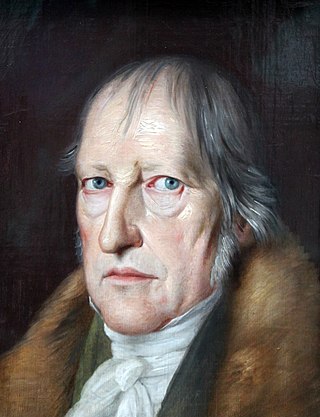In ethical philosophy, ethical egoism is the normative position that moral agents ought to act in their own self-interest. It differs from psychological egoism, which claims that people can only act in their self-interest. Ethical egoism also differs from rational egoism, which holds that it is rational to act in one's self-interest. Ethical egoism holds, therefore, that actions whose consequences will benefit the doer are ethical.
Egoism is a philosophy concerned with the role of the self, or ego, as the motivation and goal of one's own action. Different theories of egoism encompass a range of disparate ideas and can generally be categorized into descriptive or normative forms. That is, they may be interested in either describing that people do act in self-interest or prescribing that they should. Other definitions of egoism may instead emphasise action according to one's will rather than one's self-interest, and furthermore posit that this is a truer sense of egoism.

Georg Wilhelm Friedrich Hegel was a German philosopher and one of the most influential figures of German idealism and 19th-century philosophy. His influence extends across the entire range of contemporary philosophical topics, from metaphysical issues in epistemology and ontology, to political philosophy, the philosophy of history, philosophy of art, philosophy of religion, and the history of philosophy.

Historicism is an approach to explaining the existence of phenomena, especially social and cultural practices, by studying their history; that is, by studying the process by which they came about. The term is widely used in philosophy, anthropology, and sociology.
Objectivism is a philosophical system named and developed by Russian-American writer and philosopher Ayn Rand. She described it as "the concept of man as a heroic being, with his own happiness as the moral purpose of his life, with productive achievement as his noblest activity, and reason as his only absolute".

Karl Marx's theory of alienation describes the estrangement of people from aspects of their human nature as a consequence of the division of labor and living in a society of stratified social classes. The alienation from the self is a consequence of being a mechanistic part of a social class, the condition of which estranges a person from their humanity.

Elements of the Philosophy of Right is a work by Georg Wilhelm Friedrich Hegel published in 1820, though the book's original title page dates it to 1821. Hegel's most mature statement of his legal, moral, social and political philosophy, it is an expansion upon concepts only briefly dealt with in the Encyclopedia of the Philosophical Sciences, published in 1817. Law provides for Hegel the cornerstone of the modern state. As such, he criticized Karl Ludwig von Haller's The Restoration of the Science of the State, in which the latter claimed that law was superficial, because natural law and the "right of the most powerful" was sufficient. The absence of law characterized for Hegel despotism, whether absolutist or ochlocracist.

Nathaniel Branden was a Canadian–American psychotherapist and writer known for his work in the psychology of self-esteem. A former associate and romantic partner of Ayn Rand, Branden also played a prominent role in the 1960s in promoting Rand's philosophy, Objectivism. Rand and Branden split acrimoniously in 1968, after which Branden focused on developing his own psychological theories and modes of therapy.
Pseudophilosophy is a term applied to a philosophical idea or system which does not meet an expected set of philosophical standards. There is no universally accepted set of standards, but there are similarities and some common ground.

Objective idealism is a philosophical theory that affirms the ideal and spiritual nature of the world and conceives of the idea of which the world is made as the objective and rational form in reality rather than as subjective content of the mind or mental representation. Objective idealism thus differs both from materialism, which holds that the external world is independent of cognizing minds and that mental processes and ideas are by-products of physical events, and from subjective idealism, which conceives of reality as totally dependent on the consciousness of the subject and therefore relative to the subject itself.
Selfishness is being concerned excessively or exclusively for oneself or one's own advantage, pleasure, or welfare, regardless of others.

Self-ownership is the concept of property in one's own body, often expressed as the moral or natural right of a person to have bodily integrity meaning the exclusive right to control one's own body including one's life, where 'control' means exerting any physical interference and 'exclusive' means having the right to install and enforce a ban on other people doing this. Since the legal norm of property title claim incapacitates other people from claiming property title over the same resource at the same time, the right to control or interfere with one's own body in any arbitrary way is secured. Anarcho-capitalism defines self-ownership as the exclusive right to control one's body as long as the owner does not aggress upon others, leading to the concept of the sovereign individual. In Minarchism the 'exclusive right' is understood by separating the 'liberty-to' from the 'liberty-from' where for each person the 'liberty-to' is restricted by all the 'liberty's-from' of others, effectively subjecting the 'liberty-to' to the ban on the usage of force. Thereafter self-ownership means the exclusive right to control one's body insofar considering action between inhabitants and not involving the state, making it roughly a pacifist morality only among inhabitants. Self-ownership is a central idea in several political philosophies that emphasize individualism, such as libertarianism and liberalism.
David Christopher Kelley is an American philosopher. He is a professed Objectivist, though his position that Objectivism can be revised and influenced by other schools of thought has prompted disagreements with other Objectivists. Kelley is also an author of several books on philosophy and the founder of The Atlas Society, an institution he established in 1990 after permanently dissociating with Leonard Peikoff and the Ayn Rand Institute.

Absolute idealism is chiefly associated with Friedrich Schelling and G. W. F. Hegel, both of whom were German idealist philosophers in the 19th century. The label has also been attached to others such as Josiah Royce, an American philosopher who was greatly influenced by Hegel's work, and the British idealists.
The Objectivist movement is a movement of individuals who seek to study and advance Objectivism, the philosophy expounded by novelist-philosopher Ayn Rand. The movement began informally in the 1950s and consisted of students who were brought together by their mutual interest in Rand's novel, The Fountainhead. The group, ironically named "The Collective" due to their actual advocacy of individualism, in part consisted of Leonard Peikoff, Nathaniel Branden, Barbara Branden, Alan Greenspan, and Allan Blumenthal. Nathaniel Branden, a young Canadian student who had been greatly inspired by The Fountainhead, became a close confidant and encouraged Rand to expand her philosophy into a formal movement. From this informal beginning in Rand's living room, the movement expanded into a collection of think tanks, academic organizations, and periodicals.
Ayn Rand's philosophy of Objectivism has been, and continues to be, a major influence on the right-libertarian movement, particularly libertarianism in the United States. Many right-libertarians justify their political views using aspects of Objectivism.

Sobornost is a Russian term whose usage is primarily attributed to the 19th-century Slavophile Russian writers Ivan Kireyevsky (1806-1856) and Aleksey Khomyakov (1804-1860). The term expresses the need for co-operation between people at the expense of individualism, on the basis that opposing groups focus on what is common between them. Khomyakov believed that the Western world was progressively losing its unity because it was embracing Aristotle and his defining individualism. Kireyevsky believed that G. W. F. Hegel and Aristotle represented the same ideal of unity.
Selfism refers to any philosophy, theory, doctrine, or tendency that upholds explicitly selfish principles as being desirable. The term is usually used pejoratively.
Metaphysics is the branch of philosophy that investigates principles of reality transcending those of any particular science. Cosmology and ontology are traditional branches of metaphysics. It is concerned with explaining the fundamental nature of being and the world. Someone who studies metaphysics can be called either a "metaphysician" or a "metaphysicist".
The following outline is provided as an overview of and topical guide to libertarianism:









